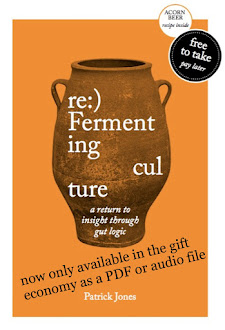Towards a biophysical poetry
Monday, July 20, 2009
Free-dragging, Slow Text and Permapoesis:
Towards a biophysical poetryIf language is of the world, like galaxies and ecosystems, this means it participates in what it represents, though how privileged it may be either as a representative or as a participant remains to be seen. Ira LivingstonI suppose it could go without saying that with every culture the interrelationships between food (survival) and art (living) are wholly understandable. To mark this point a friend and I, at an airport shop recently, wheeled a large stand of brightly coloured packets of potato chips ten metres across the floor to sit beside a large stand of brightly covered paperback books. This small, unplanned action was filmed and later published online as a free-to-air video poem called Best Sellers.
How we obtain our food directly informs our imaginative psyches and links our art to our food. In this essay I aim to make conscious the link between principles of agro-ecology and permaculture and a decapitalised and carbon fixed poetry – poetry that consciously and explicitly participates within a dynamic biosphere, not just in content but also in form. Just to be clear and ’fess-up here, when I made Best Sellers I was at an airport flying home from a festival where I had presented a paper that centred on art’s relation to carbon. In this work, I will begin with a premise based on the relocalisation of resources; present four theses identifying the material and social woes of ‘impermanent culture’; reference a fifth thesis proposed by anthropologist and activist David Graeber on the material and social woes of liberalism’s aggregate-growth model; show the transitional practices of ‘free-dragging’ and ‘slow text’ as examples of biophysical art (post John Cage); and posit the portmanteau, ‘permapoesis’, as a post-capitalist ethic that articulates an ecological mode of production for the arts.
I especially thank commissioning editor Kate Fagan for her generous assistance, critique and clear-eye over this piece, as well as Ian Robertson, Meg Ulman, Hamish Morgan, Jason Workman and Peter O'Mara for their valuable suggestions and supportive peerage. I am also indebted to David Holmgren's incredible life's work and writing, as well as Derrick Jensen and David Graeber for their inspired thinking and activism.







0 comments:
Post a Comment